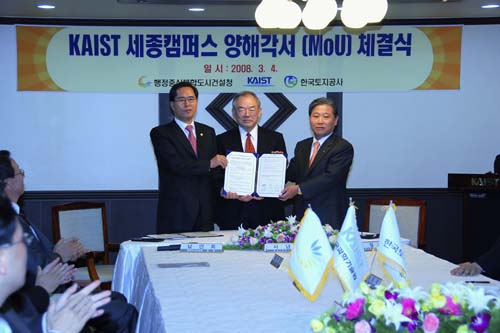Innovative+technology
-
 KAIST's Thermoelectric Generator on Glass Fabric Receives the Grand Prize at the Netexplo Forum 2015
The forum announced top ten IT innovations expected to change the world and selected the grand prize on February 4, 2014.
Established in 2007 by Martine Bidegain and Thierry Happe in partnership with the French Senate and the French Ministry for the Digital Economy, the Netexplo Observatory is an independent global organization that studies the impact of digital technology and innovation on society and business.
Every year, the Netexplo Observatory hosts an international conference, the Netexplo Forum, in Paris, France, which surveys digital innovation worldwide. The 8th forum was held in partnership with the United Nations Educational, Scientific and Cultural Organization (UNESCO) on February 4-5, 2015, at the UNESCO House in Paris.
Prior to the conference, the Netexplo Forum 2015 named the top ten most promising digital technologies that will greatly impact the world.
Among them was Professor Byung Jin Cho’s research on a wearable thermoelectric generator (http://www.eurekalert.org/pub_releases/2014-04/tkai-tgo041014.php). The generator was selected as the most innovative technology this year.
Professor Cho of KAIST’s Electrical Engineering Department developed a glass fabric-based thermoelectric generator that is extremely light and flexible and that produces electricity from the heat of the human body. This technology can be applied widely to wearable computers and mobile devices.
The full list of innovations follows below:
Wearable Thermo-Element, South Korea: The human body becomes a source of energy for mobile devices.
W.Afate 3D-printer, Togo: An environmentally friendly fablab that makes a low-cost 3D-printer from recycling electronic components.
Slack, USA: By combining email, Skype, and file-sharing and social networks, internal communication becomes much easier and simpler.
PhotoMath, Croatia: A free app that enables smartphone users to solve mathematical problems simply by scanning the mathematical texts.
Kappo, Chile: Connected cyclists produce and transmit useful data for urban planning to make the city more bike-friendly.
Branching Minds, USA: An improved learning process for students in difficulty through a personalized approach.
Baidu Kuai Sou, China: Smart chopsticks that can check food hazards.
SCio, Israel: A pocket molecular sensor with various applications and data
Rainforest Connection, USA: Fighting deforestation with recycled smartphones
Sense Ebola Followup, Nigeria: A mobile tool to help contain Ebola
For more details on the wearable thermos-element which received the 2015 Netexplo Award, please go to https://www.netexplo.org/en/intelligence/innovation/wearable-thermo-element.
Pictures 1 and 2: A high-performance wearable thermoelectric generator that is extremely flexible and light.
Picture 3: Senator Catherine Morin-Desailly (left) of the French Parliament presents the 2015 Netexplo Award to Professor Byung Jin Cho (right) on February 4, 2015 at the UNESCO House in Paris.
Credit of Loran Dhérines
Picture 4: Professor Byung Jin Cho (left) poses with Dr. Joël de Rosnay (right).
Credit of Loran Dhérines
2015.02.06 View 14483
KAIST's Thermoelectric Generator on Glass Fabric Receives the Grand Prize at the Netexplo Forum 2015
The forum announced top ten IT innovations expected to change the world and selected the grand prize on February 4, 2014.
Established in 2007 by Martine Bidegain and Thierry Happe in partnership with the French Senate and the French Ministry for the Digital Economy, the Netexplo Observatory is an independent global organization that studies the impact of digital technology and innovation on society and business.
Every year, the Netexplo Observatory hosts an international conference, the Netexplo Forum, in Paris, France, which surveys digital innovation worldwide. The 8th forum was held in partnership with the United Nations Educational, Scientific and Cultural Organization (UNESCO) on February 4-5, 2015, at the UNESCO House in Paris.
Prior to the conference, the Netexplo Forum 2015 named the top ten most promising digital technologies that will greatly impact the world.
Among them was Professor Byung Jin Cho’s research on a wearable thermoelectric generator (http://www.eurekalert.org/pub_releases/2014-04/tkai-tgo041014.php). The generator was selected as the most innovative technology this year.
Professor Cho of KAIST’s Electrical Engineering Department developed a glass fabric-based thermoelectric generator that is extremely light and flexible and that produces electricity from the heat of the human body. This technology can be applied widely to wearable computers and mobile devices.
The full list of innovations follows below:
Wearable Thermo-Element, South Korea: The human body becomes a source of energy for mobile devices.
W.Afate 3D-printer, Togo: An environmentally friendly fablab that makes a low-cost 3D-printer from recycling electronic components.
Slack, USA: By combining email, Skype, and file-sharing and social networks, internal communication becomes much easier and simpler.
PhotoMath, Croatia: A free app that enables smartphone users to solve mathematical problems simply by scanning the mathematical texts.
Kappo, Chile: Connected cyclists produce and transmit useful data for urban planning to make the city more bike-friendly.
Branching Minds, USA: An improved learning process for students in difficulty through a personalized approach.
Baidu Kuai Sou, China: Smart chopsticks that can check food hazards.
SCio, Israel: A pocket molecular sensor with various applications and data
Rainforest Connection, USA: Fighting deforestation with recycled smartphones
Sense Ebola Followup, Nigeria: A mobile tool to help contain Ebola
For more details on the wearable thermos-element which received the 2015 Netexplo Award, please go to https://www.netexplo.org/en/intelligence/innovation/wearable-thermo-element.
Pictures 1 and 2: A high-performance wearable thermoelectric generator that is extremely flexible and light.
Picture 3: Senator Catherine Morin-Desailly (left) of the French Parliament presents the 2015 Netexplo Award to Professor Byung Jin Cho (right) on February 4, 2015 at the UNESCO House in Paris.
Credit of Loran Dhérines
Picture 4: Professor Byung Jin Cho (left) poses with Dr. Joël de Rosnay (right).
Credit of Loran Dhérines
2015.02.06 View 14483 -
 KAIST to Build Branch Campus in New Administrative City
KAIST signed a memorandum of understanding (MOU) with the Multifunctional Administrative City Construction Agency and the Korea Land Corporation on March 4 to build a branch campus in the city now under construction to house many government organizations to be relocated from Seoul.
The MOU calls for building a well-facilitated KAIST campus on 310,000 square meters of land within the planned city, about 30 kilometers west of Daejeon. The multifunctional city, named Sejong City, is scheduled to be dedicated in 2014.
The MAC now being built in the Yongi-Gongju area of South Chungcheong Province is geographically in the center of South Korea, and many governmental agencies and major public organizations will move in from 2015.
The KAIST campus is envisioned to be home to a newly established College of Strategy and Policy, a Strategy and Policy Research Center, and an Innovative Technology Research Center. The College of Medical Science currently based in the Daejeon campus will be relocated to the campus. With a research-oriented hospital and a medical engineering research center, KAIST hopes to become a leading institution in disease treatment and medical engineering technologies.
The new campus is also expected to house new KAIST colleges now in the planning stage which will offer interdisciplinary courses such as the College of IT and Contents and the College of Life Sciences. KAIST also seeks to resolve housing shortage problems by building an in-campus village designed to provide international living environment for professors and students on the planned campus
2008.03.18 View 15249
KAIST to Build Branch Campus in New Administrative City
KAIST signed a memorandum of understanding (MOU) with the Multifunctional Administrative City Construction Agency and the Korea Land Corporation on March 4 to build a branch campus in the city now under construction to house many government organizations to be relocated from Seoul.
The MOU calls for building a well-facilitated KAIST campus on 310,000 square meters of land within the planned city, about 30 kilometers west of Daejeon. The multifunctional city, named Sejong City, is scheduled to be dedicated in 2014.
The MAC now being built in the Yongi-Gongju area of South Chungcheong Province is geographically in the center of South Korea, and many governmental agencies and major public organizations will move in from 2015.
The KAIST campus is envisioned to be home to a newly established College of Strategy and Policy, a Strategy and Policy Research Center, and an Innovative Technology Research Center. The College of Medical Science currently based in the Daejeon campus will be relocated to the campus. With a research-oriented hospital and a medical engineering research center, KAIST hopes to become a leading institution in disease treatment and medical engineering technologies.
The new campus is also expected to house new KAIST colleges now in the planning stage which will offer interdisciplinary courses such as the College of IT and Contents and the College of Life Sciences. KAIST also seeks to resolve housing shortage problems by building an in-campus village designed to provide international living environment for professors and students on the planned campus
2008.03.18 View 15249